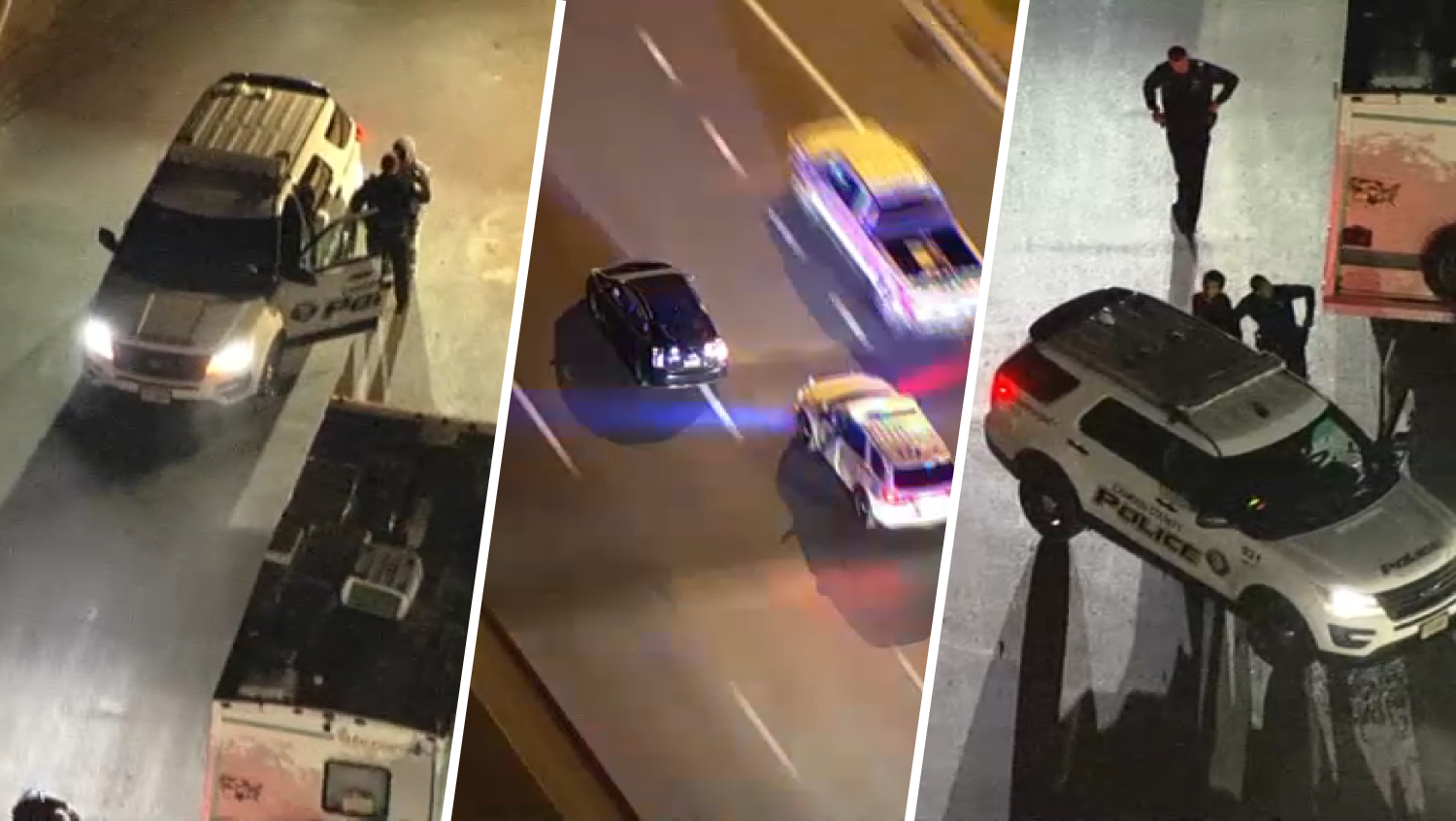The day after a massive Center City flash mob of teens led to four arrests and an officer injured, Philadelphia Police Inspector Raymond Evers had a strong message for parents and their children.
“This is a parental issue,” Inspector Evers said. “This is not a police issue. This is not a city issue. The parents should be watching their kids, what they're doing.”
The ordeal began around 6 p.m. Wednesday when police noticed an increased amount of teenagers in the Market Street East area near the Fashion District.
Sign up for our Breaking newsletter to get the most urgent news stories in your inbox.
Get top local stories in Philly delivered to you every morning. Sign up for NBC Philadelphia's News Headlines newsletter.
Then, around 7 p.m., police spotted a 13-year-old boy who appeared to have a gun, Inspector Evers said. Police chased the boy down and took him into custody. They then discovered the teen was carrying a fake but realistic-looking airsoft gun.
"If you would point this at someone who is carrying a real gun, we know what would happen. And that is a problem,” Inspector Evers said.

The crowd of teens then continued to grow on Market Street between 9th and 11th streets, police said. By 7:30 p.m., there were about 350 to 400 teens in the area, according to investigators.
Local
Breaking news and the stories that matter to your neighborhood.
There were reports on social media that the teens were throwing rocks, jumping on police vehicles and climbing street poles. Inspector Evers confirmed that those reports were accurate.
"It's all true,” he said. “They were disorderly. These kids weren't down here to have fun."
Along with the 13-year-old boy, police also arrested a 13-year-old girl, 15-year-old boy and a 17-year-old boy. All four teens were charged with disorderly conduct. None of the teens are from Center City, according to Inspector Evers.
While a police officer was preparing paperwork for the 13-year-old girl, a friend of the teen tried to release her from the back of the police vehicle, Inspector Evers said. The officer chased after that friend and blew out his knee in the process. The officer will be out of work for eight months to a year in order to get a full knee reconstruction, according to Inspector Evers.
Police also took a fifth person into custody Wednesday night in connection to a robbery that occurred Tuesday night on 2nd and Chestnut streets. He was brought in as a person of interest and a warrant is pending for his arrest.
Ultimately, it took police until about 9 p.m. to get the crowds off of Market Street.
"Our belief is these juveniles were not down here to go to the movies or go to the mall and have fun,” Inspector Evers said. “They were here to be disorderly and we have to handle that as we see it."
Inspector Evers said there would be increased patrols in Center City to make sure a similar incident doesn’t happen again.
"When something like this happens out of the ordinary, I have to pull officers from South Philadelphia, West Philadelphia, North Philadelphia to help,” he said. “So that draws that police presence and the service that we give to other neighborhoods gets drawn out because we have to handle this problem here."
Inspector Evers also commented on the role social media played in the coordination of the flash mob.
"I'm not big on social media but these kids have different apps that we're just not grabbing yet,” he said. “To gather 400 people, 350 people, it takes a lot of effort through social media. We're still working that. Our intel bureau is looking into that. We're doing our things. Coordination with SEPTA is important also because they are using SEPTA to get from point A to point B."
That coordination includes working with SEPTA to find out ahead of time when large groups of teens are gathering, according to Inspector Evers.
“They're utilizing SEPTA and they're not using a TransPass, they're jumping the turnstile. And that's something SEPTA is working on,” Inspector Evers said. “They're doing different mechanical things they can in reference to turnstile jumping. They're using SEPTA so we're coordinating with SEPTA to use intel when groups of kids are coming through.”
Inspector Evers mentioned the resources currently available to children throughout Philadelphia.
“We have 170 rec centers in the city. We have 26 PAL centers in the city and we have numerous sports leagues and church groups throughout the city,” he said. “This is what the kids should be doing.”
Towards the end of his press conference on Thursday, Inspector Evers reiterated his message toward any children looking to cause trouble as well as their parents.
"I don't like to use the word zero tolerance because we do have tolerance for juveniles. We do. Because we don't want them to get into the system,” he said. “But acts like last night, we're going to have very, very little tolerance if your kids come to Center City and act a fool. You will be arrested and we'll make sure you go in front of juvenile judges to make sure you get the proper treatment that you need. This is not a playground.”
"I’m saddened when young people engage in behavior that endangers themselves and others, especially because it is not representative of the majority of our city's youth, who are positively engaged in their communities," Kenney wrote. "We all must work together to support our young people."
Kenney also shared a link to programs and initiatives for Philadelphia teens.
What's the Solution?
Currently, teenagers 14 years of age and above have a 10 p.m. curfew in Philadelphia while children 13 years of age and below have a 9:30 p.m. curfew. Inspector Evers suggested changes to the city’s curfew policy in light of Wednesday night’s chaos.
"Obviously this happened out of curfew,” he said. “Our ask is for City Council, the mayor's office, for certain areas of the city -- not just Center City, there's other areas that have juvenile issues -- is to make a special curfew for special areas that have special problems."
Philadelphia City Councilmember Jamie Gauthier doesn't believe more curfews will solve the problem however.
"I do not think that the way out of the behavior we saw yesterday is more forms of enforcement for young people," she said. "The way out of the behavior we saw yesterday are activities enriching -- educational activities -- for young people to participate in and caring adults who can mentor and engage young people."
Rickey Duncan has worked with the city's youth through his nonprofit organization, the NoMo Foundation. He told NBC10 it will take more resources, such as mentorship and promoting rec centers, to get more kids off the street.
"A lot of time we blame it on the parents," he said. "These are all our children. These are our neighbors. So we got to find a way that we reduce this thing before it gets out of control."
Kendra Van de Water, the founder of YEAHPhilly, a nonprofit focused on preventing youth violence, also said the parents of the children committing bad behavior shouldn't get all the blame.
"Sometimes, you know, families are struggling," she said. "A lot of times families are struggling. They're working a lot of jobs to put food on the table. We can't always keep up with what our kid, even if they live with us, are doing. So we need the village and today in 2023, a lot of young people don't have that village."
Van de Water told NBC10 the juvenile court system needs to be reformed.
"We see people get sent away and when they come home they still don't have their documents," she said. "They still don't have any skills. They still didn't finish high school. So they're coming home back to the communities with no support and there's no rehabilitation."



